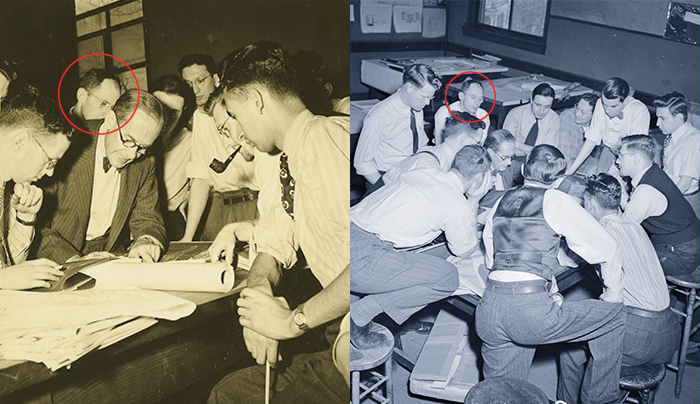
The trouble with the contemporary generation is that it has not read the minutes of the last meeting.
Richard Weaver (1910–63)
from Ideas Have Consequences

The trouble with the contemporary generation is that it has not read the minutes of the last meeting.
Richard Weaver (1910–63)
from Ideas Have Consequences
I’ve been reading Benjamin Dreyer’s Dreyer’s English: An Utterly Correct Guide to Clarity and Style, and even though I’m only about forty pages in, I’m pretty sure Mr. Dreyer is my spirit animal.
For one thing, while he admits that “[t]here are fewer absolutes in writing than you might think,” he also confirms one of my long-held suspicions: “Only godless savages eschew the series comma.”
For another, he’s refreshingly honest:
I suspect that I’m not the only person currently reading this page who was not especially well trained, back in school days, in the ins and outs of grammar. When I started out as a copy editor, I realized that most of what I knew about grammar I knew instinctively. That is, I knew how most—certainly not all—of the grammar things worked; I simply didn’t know what they were called.
Even now I’d be hard-pressed to tell you what a nominative absolute is, I think the word “genitive” sounds vaguely smutty, and I certainly don’t know, or care to know, how to diagram a sentence.
Finally, Dreyer makes the argument I’ve been trying to make for twenty years now. “I swear to you,” he writes, “a well-constructed sentence sounds better. Literally sounds better.”
Sweet, sweet vindication. I was starting to feel like I was taking crazy pills.
This short clip serves as a welcome reminder that (1) nobody works in isolation, and (2) we all need an editor.
And, of course, that Goodfellas is a singular achievement in American filmmaking.
So this story about the pay gap between women’s soccer players, gender discrimination, and unequal pay is interesting. Not, of course, because I care, but because the larger question – Why are we paying adults to play games in the first place? – really ought to be addressed first.
I recently discovered Nick Cave & The Bad Seeds’ The Skeleton Tree (2016). It’s sublime.
Scientific American on authenticity: “Once you take a closer scientific examination, it seems that what people refer to as their ‘true self’ really is just the aspects of themselves that make them feel the best about themselves.” Wow. Thank God for science, amirite?
I’m reading Neal Stephenson’s latest – Fall; or, Dodge in Hell – and it’s pretty damn good so far.
“[S]uccess and productivity increase for the first 20 years after the inception of a career, on average,” writes Arthur Brooks. “So if you start a career in earnest at 30, expect to do your best work around 50 and go into decline soon after that.” I reckon I’ve already peaked, then. Let’s, um…keep this between you and me, mkay?
The folks at More in Common just released the results of a study that “explores how Americans tend to have a distorted understanding of people on the other side of the aisle, what causes it, and why it matters.” They call it the Perception Gap, and it’s…not encouraging.
On staying “informed”:
You might think that people who regularly read the news are more informed about their political opponents. In fact, the opposite is the case. We found that the more news people consumed, the larger their Perception Gap. People who said they read the news “most of the time” were nearly three times more distorted in their perceptions than those who said they read the news “only now and then.” We can’t prove that one causes the other, but these results suggest that rather than making Americans better informed, media coverage is now feeding our misperceptions.
On education:
Education is intended to make us better informed about the world, so we’d expect that the more educated you become, the more you understand what other Americans think. In fact, the more educated a person is, the worse their Perception Gap – with one critical exception. This trend only holds true for Democrats, not Republicans. In other words, while Republicans’ misperceptions of Democrats do not improve with higher levels of education, Democrats’ understanding of Republicans actually gets worse with every additional degree they earn. This effect is so strong that Democrats without a high school diploma are three times more accurate than those with a postgraduate degree.
Youre gonna want to read the whole thing.
To see just how fast things came together for the Myrtle Woldson Performing Arts Center exhibit, check out this time-lapse video:
Kind of makes the process look seamless and simple, doesn’t it? But exhibit installations are actually very complicated.
What you don’t see in the video is the time it takes to collect the artifacts, measure them, determine how they’re grouped, and decide where each gets placed inside its respective display case. And then you have to figure out what to do when there are too few artifacts for a case (conduct more research and purchase some related objects) or too many (argue over what gets tossed).
Once you’ve done all that, you can then determine how each artifact gets supported within its case – directly on a flat surface, lifted, stacked, or tilted in favor of the viewer. Then you need to either find or fabricate the supports. This exercise determines the Plexiglas height. (For the Wolson Collection, each of the 15 individual Plex-top heights is different.) And all of this takes place after you’ve designed the display case groupings and had the bases fabricated, never knowing how many artifacts will actually be shown. The video makes putting a 120-pound, 6-foot-tall Plexiglas cover over the nearly 7-foot-tall dress form – under a 12-foot ceiling – seem pretty easy. And we haven’t even talked about the narrative panels and touchscreens yet.
With the help of my exhibit design assistant Steven Kutsch, along with a few others, we managed to make it all come together. Thankfully, the video skips over the challenges while serving to remind us that you can’t go through this experience without developing a tremendous respect and appreciation for an exhibit’s subject.
We do hope that Miss Woldson would have approved.
Though this is an interesting and welcome admission – inasmuch as writers have historically been the Dalits of this business of ours – I have a couple of nits I’d like to pick.
First, the author, Katharine Schwab, seems to think that writing is just another skill for designers to pick up on the side, as if all it takes is a couple of TED Talks to achieve expert wordsmithery. Writing is a craft, not a skill. “The difference,” wrote Twain, “between the almost right word and the right word is really a large matter—’tis the difference between the lightning-bug and the lightning.”
Second, the piece ignores the fact that writers and designers are very, very different types of people. If you’re fundamentally a designer who happens to know her way around sentence structure, swell – but you’re still a designer, which means you think like a designer. It’s not wrong, it’s just different. Think of it this way: Ever hear a classical musician attempt jazz? It’s dreadful. Sure, it’s all music, but just because you’re a Curtis grad doesn’t mean you can swing. (In fact, it probably means the opposite.)
If Schwab’s article leads to a greater appreciation of writing and writers, then, well…great. But on the subject of “writing as the next most important skill for designers,” color me dubious.

from BROKEDOWN PALACE
Robert Hunter
River gonna take me
Sing me sweet and sleepy
Sing me sweet and sleepy
all the way back home
It’s a far-gone lullaby
sung many years ago
Mama, Mama, many worlds I’ve come
since I first left home
Going home, going home
by the waterside I will rest my bones
Listen to the river sing sweet songs
to rock my soul
As a follow-up to yesterday’s post, I’m sure that none of you will be shocked to learn that women rate 80 percent of men as “worse-looking than medium.” So, basically, four out of five of us are ugly. Meanwhile, men – the more statistically rigorous of the sexes, it would seem – rate only 50 percent of women as worse-looking than medium.
It’s all laid out in a fascinating article about what happens when you apply the Gini coefficient, a tool used by economists to study inequality, to the dating economy. It’s…not good. “Technology,” concludes Bradford Tuckfield, “has not enabled us to escape the brutal social inequalities dictated by our animal natures.”
This is not to say that we haven’t tried. The institution of monogamy is itself a “redistributive” type of policy: like capping the income of billionaires, it caps the total allowed romantic partners of the most attractive, so that unattractive people have much better chances to find a partner. The marriages that we read about in historical accounts that are based on prudence and family arrangement make more sense when we realize that basing marriage on mutual attraction leads so many—both men and women—to be unsatisfied with the outcome, since most women find most men unattractive.
Explains so much, doesn’t it?
A study published nearly 20 years ago found that attractive children and adults were not only judged more positively than those who were unattractive, but also treated more favorably.
According to Maxims or Myths of Beauty? A Meta-Analytic and Theoretical Review, attractiveness, which is apparently universal, had a profound affect both on social appeal and on perceptions of occupational and interpersonal competence – as well as attention and reward.
As an unattractive middle-aged white dude of average intelligence and little in the way of marketable skills, I’m actually pretty excited about this. I mean, it’s only a matter of time before my people rise up and demand their rightful place at the grievance table, right? Which means I’ll get a piece of all the rights and privileges thereto pertaining.
Until then, I’ll just take comfort in finally knowing why CK yells at me all the time while giving Skooch a free pass.
When I was a kid, my stepdad kept a spinthariscope in his sock drawer.* And every once in a while he’d let me take it to bed – because the best way to actually see the radium atoms decaying was in the dark, once your eyes had grown accustomed to the low-light conditions.
But I got to wondering the other day whether letting an eight-year-old sleep with a radioactive toy was, you know, a good idea – never mind holding it up to your eye for hours on end. Granted, this was back when seat belts were optional and second-hand smoke was a feature rather than a bug, but still.
Thankfully, Randall Munroe put my mind at ease with this handy Radiation Dose Chart:

Here’s the full-sized PNG image. It appears I’ll be OK – for the time being, anyway. Oh, and here’s more information on spinthariscopes, including a link to purchase your very own – using thorium instead of radium bromide – for the low, low price of just $49! Sounds like the perfect Father’s Day gift to me.
*No, I don’t know why. I mean, I know why he owned a spinthariscope – because they’re awesome – but his sock drawer?
Sorry, but there’s no such thing as a photographic memory, you can’t learn while you sleep, and multi-tasking is impossible. More on the limitations of memory.
Looks like the kids who were always chosen last in gym class are now writing research papers.
Matthew Walther on America’s greatest divide: “[T]he most fundamental division in American life is not partisan or geographic or, except incidentally, racial or religious. The real gap is…between the sort of people who accepted the sinister logic of credentialism and took their places in our globalized meritocracy and those who, for any number of reasons, remained behind.”
Now this looks promising.
Did you know that the complete Underground Grammarian newsletters are not only available online, but also free? And that’s not all…
My friend Darrell Sullens passed away May 26. Darrell served in the Navy aboard the USS Pickerel, and was a well-known painter in the local art scene. He also opened an art supply store in 1978, the very year I started the design program at SFCC. When I wrote a blog post about his shop a couple of years ago, Darrell kindly commented. “We made many life long friends while running our little business,” he wrote. My wife Linda and I are grateful to be among them.
Last year helveticka celebrated its 30th anniversary. As part of the festivities, we designed an exhibit featuring 30 collaborators who helped us reach that milestone – individuals who made an impact both on my business and, in many cases, on me personally. Darrell was one of them. Here’s his story, along with my commentary, as shown in the exhibit:

I. M. Pei recently passed away, but not without leaving a legacy of several iconic buildings from around the world. So it seems appropriate that I should share his (albeit thin) connection to one of Spokane’s finest architects.
While researching imagery for our 2013 exhibit SPOMa: Spokane Modern Architecture, 1948-73, I ran across a photograph taken in the mid-1940s at Harvard University’s Graduate School of Design. Under the tutelage of Walter Gropius – Bauhaus founder and world-renowned architect in his own right – there was a three-year waiting list to be accepted into this prestigious program.

(left) Gropius, wearing a bow tie and glasses, is surrounded by his students. (right) Pei is in the foreground, wearing a vest, his back to the camera. Photographs courtesy of the Francis Loeb Library, Harvard Graduate School of Design.
Though the photo caption didn’t identify all the subjects, one particular student caught my eye. Was it possible that it could be Royal A. McClure? I got in touch with Harvard’s archives and discovered there were additional images taken on the very same day – March 22, 1946 – with identities noted. Much to my surprise, the gentlemen with the receding hairline, narrow face, and round glasses was indeed McClure.
Both McClure and Pei graduated in 1946, Pei going on to become one of the great modernists of our time, McClure landing in Spokane in 1947. The partnership he formed with Tom Adkison ultimately became ALSC Architects.
So what sort of influence did McClure have on Spokane’s own mid-century modern movement? Tom Kundig had some thoughts back in 2003:
Most people have watersheds in their careers. Tom Kundig had a water cabin. When he was a boy vacationing with his family on Lake Coeur d’Alene…, he was drawn to this 1960 Modernist cabin designed by his father’s boss, the architect Royal McClure. ”It left an impression on me even then,” he said. ”It was a very classic midcentury design, with delicate detailing and proportions — open to the landscape and very optimistic.” Thirty-odd years passed, and Kundig became an architect like his dad and started building weekend getaways for his own clients. Five years ago, he was on a Coeur d’Alene building site when a flashback made him wander down the road a bit. In a perfect bit of coincidence, there stood the McClure cabin. ”That little cabin helped teach me to keep things light and expressive of the landscape,” he said.
After studying several instances of what we now call “spontaneous human combustion,” French agronomist Pierre-Aimé Lair (1769-1853) discovered that most of the cases involved “corpulent older women with a penchant for drink, thus combining fat and alcohol in a literally explosive mix.” His conclusion:
Thus there is no cause for surprise that old women, who are in general fatter and more given to drunkenness, and who are often motionless like inanimate masses, during the moment of intoxication, should experience the effects of combustion.
I’ve long suspected as much.
Anyway, it’s all there in Christopher E. Forth’s Fat: A Cultural History of the Stuff of Life, which hits bookshelves next month. Until then, you can read all about the black market in human fat over at The Atlantic.